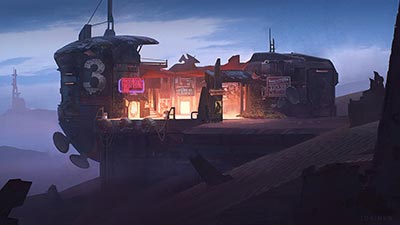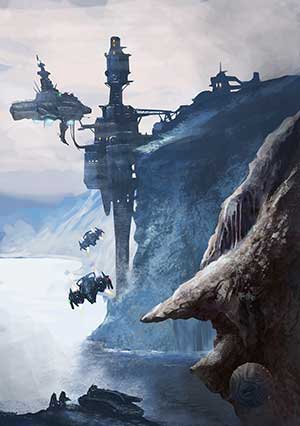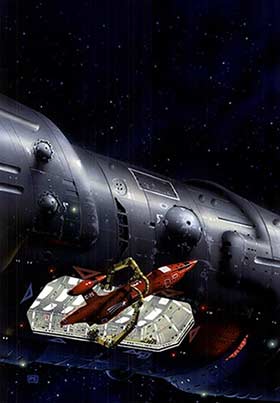Welcome to Soldier Searcher Speaker Savant!

S4 requires the Cypher System Rulebook created by Monte Cook Games. Like other Cypher-based settings such as Numenera and The Strange, Soldier Searcher Speaker Savant is a lightweight, story-driven game that is easy to learn and fun to play.
Galactic Gazetteer
Have Blaster, Will Travel
The Milky Way is a huge, lawless, chaotic galaxy. In its long history, thousands of sentient species have risen up from their respective homeworlds and spread out across its stars bringing strange cultures, customs, and trade to one another. Many of those species inevitably vanished again millennia or even eons later leaving ruins and artifacts for hapless explorers to discover. Many more live on, scattered across countless worlds. Every one of those worlds has a story, or thousands, and adventure, mystery, danger, and hijinks lurk around every star.
Humanity in the Galaxy
When humans discovered the hyperdrive, they struck out from Earth like locusts across the Milky Way Galaxy. What they found was a noisy rabble of galactic neighbors there to greet them. Even among the glut of alien species, humans flourished and quickly became the most widespread species in the galaxy second only to the gobbans. Then, dark times fell…

The Empire of Sol, as it was called, lasted three months before an armada, both human and alien, rained down vengeful wrath upon Earth from orbit. The wonder of the hyperdrive had brought humanity more freedom than they had ever known. The self-sufficient colonies needed no tyrannical authority ruling over them and reaping the benefits of their worlds. And so the Earth was defeated, its few remaining important resources plundered, orbital sentinel stations built, its citizens given the choice to join their brothers and sisters across the galaxy or remain behind, prisoners of a single world in a galaxy teeming with opportunity.
Many interstellar cultures before humanity had tried interstellar empire. All had failed. The lesson being, that unlike a single world, disparate planets across vast reaches of space do not lend themselves well to borders or the enforcement of such a thing by any authority, especially when it is plain that that authority is bent on gainful exploitation. The galaxy is just too damn big. Earth, like many before it, learned this lesson the hard way and became a backwater because of it. Travelers to the Sol System are advised that Mars is still a pleasant destination.
The Galaxy Today

The most widespread type of central government in the galaxy is the single star system under the hegemonic rule of the system’s homeworld. The Sol System is among these, with Mars serving as its capital. Single planetary governments are also common and some systems are home to several rival planets. Many species with interstellar flight also come from worlds with multiple or even dozens of planetside nation-states and competing factions.
Many inhabited worlds exist that have not developed interstellar flight. The inhabitants of these worlds are often dangerous barbarians. These backward planets are generally ignored; they have nothing to offer the more technologically advanced species that cannot be found easily or more cheaply elsewhere. Rare primitive backwaters that do have resources or commodities of interest will find themselves in the midst of an alien invasion in short order.
Most of the inhabited worlds of the galaxy are incredibly diverse places. They have a variety of ecosystems and a wide cultural mix. It is rare to find a world that sports a single rigid type of people or environment. That said, various similar alien species tend to congregate with one another. For instance, humanoid species are more likely to associate and trade with other humanoids. This is not usually from any sort of petty bigotry, but more out of the difficulty of the inherent hurdles of forming beneficial relationships between truly alien psychologies and/or physiologies. The humanoid species of the galaxy all tend to be at least vaguely similar to one another, like the jovianoid species, or the siliconoid species. Interspecies relations between vastly different physiological types are not unheard of and are mostly of a commercial nature, but they tend to be rare.
If there is one prevailing unifier in galactic citizenship, it is paranoia. Perhaps this is just a holdover from every species pre-sentient animal brain, or maybe it is the price of evolving that sentience. Many races or planetary governments will guard their technical achievement fiercely for fear that enemies will use those secrets against them. In addition, nearly every individual is packing at least one weapon. Blasters, stunners, and mnemonic melee weapons are a common sight at any starport. Outside the ports, or their surrounding cities, this varies from world to world. The paranoia may still be there, but local law enforcement more often than not frowns upon armed civilians roaming the countryside.
